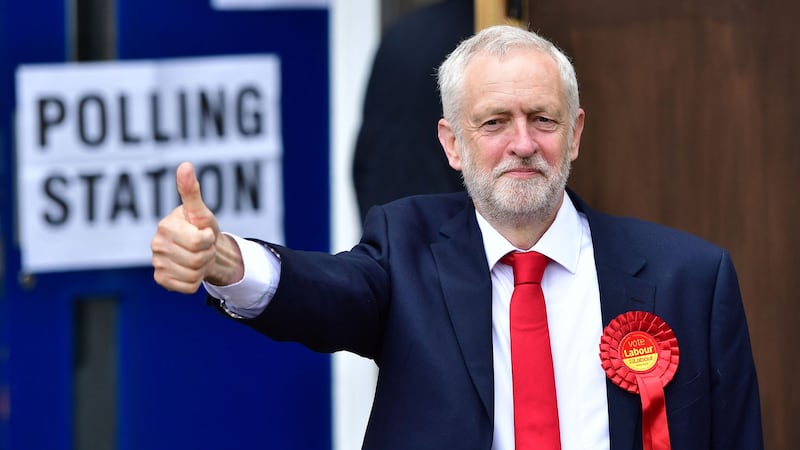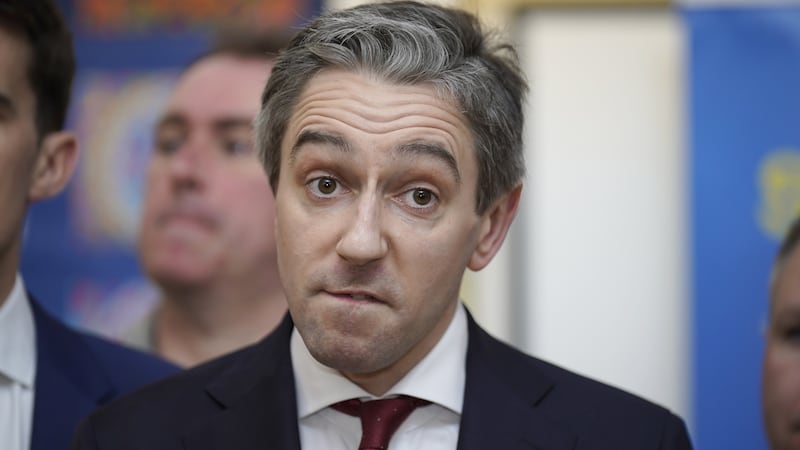Theresa May wanted people to give her the power. Jeremy Corbyn wanted the power to give to people. That sums up the general election.
In Ms May’s case, she sought power to protect careers, troubled political projects and internal party agendas. For Mr Corbyn’s part, he wanted power to promote rights and opportunities, and a different policy dialogue for social change.
Ms May’s individualism lost ground. Mr Corbyn’s idealism gained traction. The Westminster result flowed directly from the distinct motivations of the main political actors.
That’s why Ms May is now entering the political death zone as prime minister, probably by the autumn. And it’s why Mr Corbyn has established a momentum that could make him Britain’s next premier, possibly within a year.
For the past couple of months, seasoned political players here in the north have been trying to make sense of the post-Assembly election landscape.
But how do you fit a framework onto chaos? It’s like lifting mercury with a fork. Local and geo-politics are simply moving too quickly and too unpredictably, with too many competing factors and clashing variables, to analyse a measured and careful pathway for progress on a daily basis. Following last week, the pace and variables have multiplied again.
There’s a need to step back and take a broader historical view. Watch the tide, not the waves.
Motivations shape political outcomes, while interests shape political strategy. That’s why Mr Corbyn’s ‘ideas’ agenda is working. His successful strategy has positively married his personal motivations with his political interests.
Writing in this column two years ago, I commented on this aspect of Mr Corbyn’s then-campaign to become Labour leader:
“Look at the front page of yesterday’s London Independent. It rehearsed the narrative that Labour is now ‘less electable’ because it doesn’t appeal enough to Tory voters. (Really? Follow the mob? But what if Labour is currently ‘more effective’ while being ‘less electable’?)
This perpetuates the elite myopia that winning the power pinnacles of elected politics (often depressingly negative) is the only show in town.
It’s not. Politics is about ideas, and values, and argument, and communities. It’s about shaking dreams and waking visions of different tomorrows; making citizens individually and collectively strong enough to unilaterally harness their own brilliance and rights – and diversities – against a modern culture of disempowerment, without needing or asking permission. Politics should stimulate independent thinking.”
That was July 2015. Mr Corbyn’s political interests (to ultimately wield Downing Street power) are now closer to fruition precisely because of his positive motivations (to make politics an exercise in mass social participation).
This carries strategic lessons for local politics. Motivations matter.
The respective motivations and interests of parties and voters here are now firmly established. With a high 65.4 per cent turnout, voters have been mainly motivated by their distinct constitutional allegiances – British and Irish. Around 46 per cent backed the main unionist parties; around 42 per cent backed the main nationalist parties.
The overall outcome once again broadly reflects the certainty of substantially changed (and changing) demographic realities. These must be acknowledged, but they're not a shock.
The priority should be maintaining a stable social framework in which changing demographic realities can now unfold. Because they are unstoppable.
Understandably, the interests of the two main parties are being focused by current electoral fallout in London (for the DUP) and future electoral fallout in Dublin (for Sinn Féin).
And yet in the context of Westminster’s instability and Brexit’s impending turmoil, the north’s election results now invite something that only strong winners can ever give – namely, maximum generosity to one’s opponents.
The re-establishment of the Assembly and political institutions, in particular the North South Ministerial Council, should be a priority. The primacy of politics and legitimacy of law must be maintained.
Nationalism should be relentless in reassuring unionists that post-Brexit arrangements will support the inclusive political framework of the Good Friday Agreement. Unionism should show wisdom in acknowledging the long-term reasons why the nationalist vote has intensified, and addressing related realities. Both governments should proactively set the tone.
Local political generosity – motivated in the public interests of all citizens – could provide a lighthouse of stability in the midst of the current political mayhem.Whatever happens on the details of multi-party talks, everyone should take a deep breath.
The world is facing a generation of transformation. There is no perfect framework to manage the chaos. Only shared, positive motivations can guide our diverse interests as a society towards better outcomes.
Politics is bigger than elections. Watch the tides, not the waves.








